In our latest State of Revenue Operations report we explored the role of revenue operations in 2024. From RevOps backgrounds to their responsibilities, and time-wasting tasks to measuring success, we've compiled those findings to take a look at key trends in this article.
Skip ahead to:
Before RevOps
Let’s start by discussing how long RevOps pros have worked in the field. A quarter (25.58%) have been in RevOps for one to two years, 28.68% for three to five years, and 26.36% for five to nine years. Less than a fifth (19.38%) have worked in RevOps for over 10 years.
Before their time in RevOps, the majority (31.01%) of our community spent five to nine years in another role. And 29.46% spend over 10 years in a previous role, leaving 39.53% with less than five years experience before taking their RevOps role.
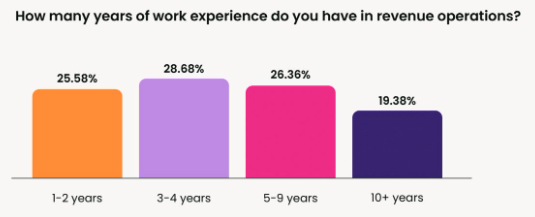
So what roles lend themselves to switching to revenue operations?
Well, a whopping 45.74% of respondents worked in Sales Operations prior to their roles in RevOps, this makes sense as many organizations have transitioned sales ops to RevOps in recent years.
This is followed by Sales roles at 13.96%, and general ‘Operations’ roles (12.4%).
Our community also report working in these areas before starting their RevOps career:
- Chief of Staff
- Customer success
- Executive Assistant
- Finance
- Governance
- Instructional Design
- Marketing
- Marketing operations
- Product
- Project management
- Sales/Revenue Enablement
- Strategy
- Technology
- Web Developer
Making it clear – while sales ops is the most common route into RevOps there are plenty of career paths outside of this norm.
Responsibilities
Next, we explored which responsibilities were most common in the RevOps role, as this often varies from organization to organization.
The most common revenue operations responsibility is metrics and KPIs with a huge 92.25% of our respondents saying that’s a main part of their role. This is followed by pipeline strategy (78.29%) and tech stack management (76.74%).
In contrast, recruiting and hiring was the least common responsibility with under a quarter (23.26%) of pros saying this is part of their role.
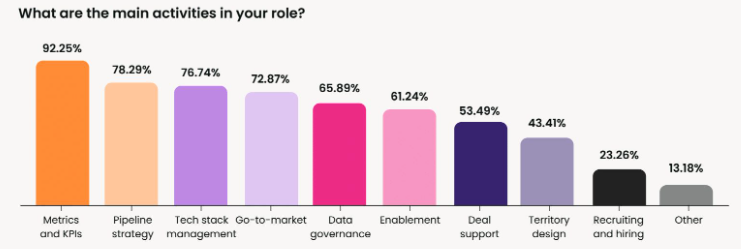
However, a pattern emerges when you break this data down by job seniority. Unsurprisingly no junior professionals report recruiting and hiring as part of their role. This makes sense as these early-career professionals are unlikely to be in managerial positions.
100% of senior RevOps pros say that metrics and KPIs are part of their role. But more interestingly, the increasing importance of go-to-market is apparent the more senior you are. Four out of five senior respondents (80.77%) reported GTMtime-wasting as part of their role versus only 55% of junior professionals.
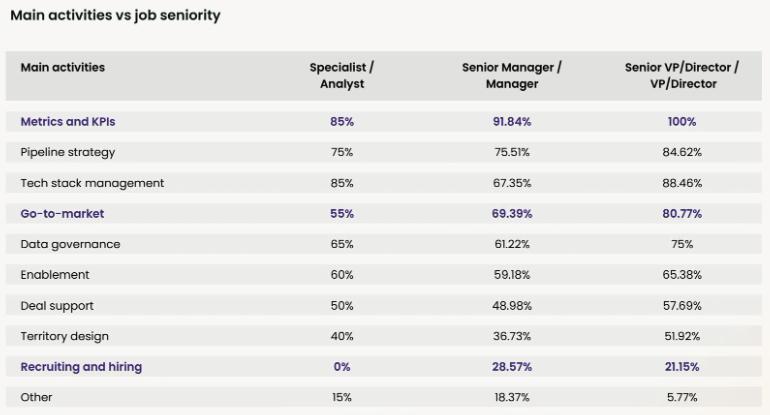
Time wasters
We also wondered which activities were taking up our respondents’ time without any real impact. The biggest offender was manual data cleansing with 46.51% highlighting it as a time suck. This was followed by meetings (25.58%), getting approval/navigating red tape (13.95%), and spreadsheet work (10.08%).
Some other time-wasting activities highlighted by our community include: working on non-RevOps tasks, tactical manual tasks (rather than strategic work), managing tools, and agreeing on the remit of RevOps vs sales enablement.
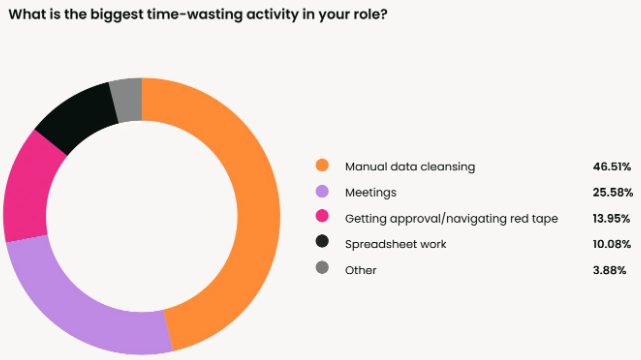
Revenue operations pros also spend a significant amount of time interacting with internal stakeholders everyday. The majority of our respondents (34.88%) report spending between 30 and 50 percent of their time on this kind of communication.
That’s a lot of time spent in conversation, rather than implementing!
A further 22.48% spend 50-70% on internal communication, and 18.61% spend over 70% of their time on this! That leaves a lucky 24.03% spending less than 30% of their time on cross-functional comms.

Measures of success
As for metrics, ARR/MRR (79.84%), close rate (68.99%), and revenue retention (65.89%) maintain their top spots from last year. However, notably, revenue retention has seen the biggest growth in teams tracking it over the last year, up 20.79% from 2023.
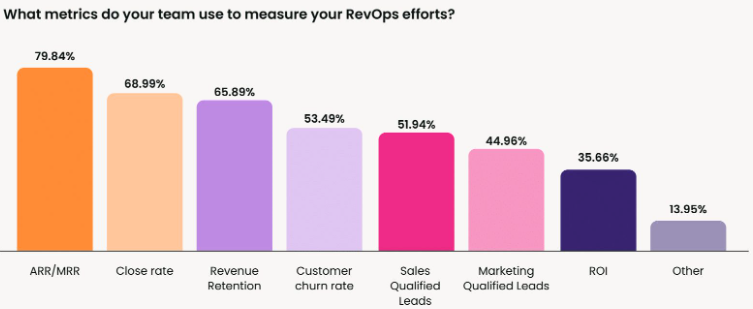
This shift may indicate an increased focus on customer retention in organizations overall, as it becomes cheaper to retain customers than acquire new ones.
It’s great to see almost all of these metrics increase in use for revenue operations teams. Last year it was clear many teams were unsure how best to track their impact, and while some are still struggling, our statistics show clear growth in this area.
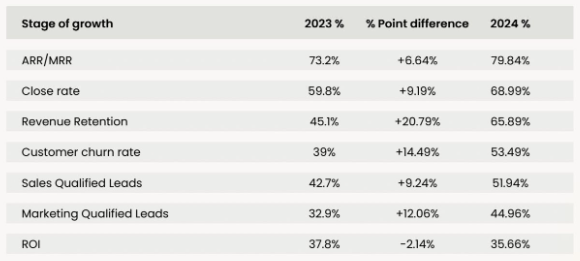
Top RevOps skills
For the second year, problem-solving is ranked as the most important skill by our community (89.15%). This is followed by strategic planning (72.09%) – which has moved up three places from fifth last year – and collaboration with coworkers (70.54%).
The least important skills for RevOps pros this year are empathy (39.53%) and selling (17.05%). While we’re not sure on why empathy isn’t a valued skill, we’re glad to see that a background in sales isn’t needed to succeed in the revenue operations career path.

Unsurprisingly, problem-solving and data analysis are still top-ranked skills for RevOps managers (41.08% and 19.38% respectively), but following the trend of an increased emphasis on strategy, strategic planning takes joint third place with communication (both 13.18%).
For strategic planning, this is an increase of 5.88% since last year. This suggests not only a rising emphasis on strategic RevOps, but that strategy isn’t just for senior leaders. Revenue Operations Managers are also being asked to step up their strategic thinking.
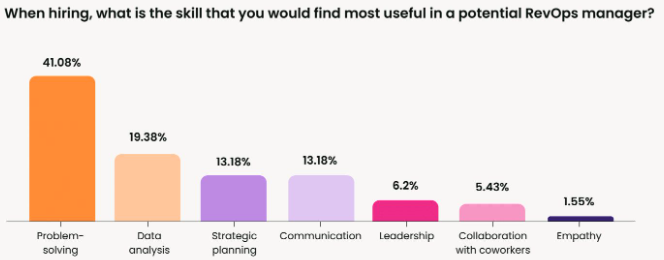
Need more data into the state of RevOps?
.png)
Compare your situation to other revenue operations professionals around the world with our State of Revenue Operations Report 2024.
All the data you need and more. 👉




